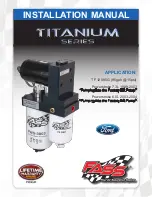
06 Starting and driving
Brake system
06
``
143
BRAKE Brake circuit malfunction
The brake system is a hydraulic system con-
sisting of two master cylinders and two sepa-
rate brake circuits. If a problem should occur in
one of these circuits, it is still possible to stop
the vehicle with the other brake circuit.
If the brake pedal must be depressed farther
than normal and requires greater foot pressure,
the stopping distance will be longer.
A warning light in the instrument panel will light
up to warn the driver that a fault has occurred.
If this light comes on while driving or braking,
stop immediately and check the brake fluid
level in the reservoir.
NOTE
Press the brake pedal hard and maintain
pressure on the pedal – do not pump the
brakes.
WARNING
If the fluid level is below the
MIN
mark in the
reservoir or if a
Brake failure – Service
urgent
message is displayed in the text
window:
DO NOT DRIVE
. Have the vehicle
towed to a trained and qualified Volvo serv-
ice technician and have the brake system
inspected.
NOTE
When the vehicle is at a standstill and the
engine is idling, e.g. at a traffic light and the
brake pedal is depressed, the pedal may go
down slightly. This is a normal function of
the power-assisted brake system.
Power brakes function only when the
engine is running
The power brakes utilize vacuum pressure
which is only created when the engine is run-
ning. Never let the vehicle roll to a stop with the
engine switched off.
If the power brakes are not working, the brake
pedal must be pressed approximately four
times harder than usual to make up for the lack
of power assistance. This can happen for
example when towing your vehicle or if the
engine is switched off when the vehicle is roll-
ing. The brake pedal feels harder than usual.
Water on brake discs and brake pads
affects braking
Driving in rain and slush or passing through an
automatic car wash can cause water to collect
on the brake discs and pads. This will cause a
delay in braking effect when the pedal is
depressed. To avoid such a delay when the
brakes are needed, depress the pedal occa-
sionally when driving through rain, slush etc.
This will remove the water from the brakes.
Check that brake application feels normal. This
should also be done after washing or starting
in very damp or cold weather.
Severe strain on the brake system
The brakes will be subject to severe strain
when driving in mountains or hilly areas, or
when towing a trailer. Vehicle speed is usually
slower, which means that the cooling of the
brakes is less efficient than when driving on
level roads. To reduce the strain on the brakes,
shift into a lower gear and let the engine help
with the braking. Do not forget that, if you are
towing a trailer, the brakes will be subjected to
a greater than normal load.
Anti-lock brakes (ABS)
If the warning lamp lights up there
is a malfunction of the ABS system
(the standard braking system will
however function) and the vehicle
should be driven cautiously to a
trained and qualified Volvo service technician
for inspection. The Anti-lock Braking System
(ABS) helps to improve vehicle control (stop-
ping and steering) during severe braking con-
ditions by limiting brake lockup. When the
system "senses" impending lockup, braking
pressure is automatically modulated in order to
help prevent lockup, which could lead to a skid.
The system performs a self-diagnostic test
when the engine is started and when the
Summary of Contents for 2009 XC90
Page 1: ...VOLVO XC90 Owner Manual Web Edition ...
Page 2: ......
Page 8: ...Contents 12 12 Index Index 274 ...
Page 9: ...Contents ...
Page 15: ...01 SAFETY ...
Page 49: ...01 Safety 01 ...
Page 51: ...02 INSTRUMENTS AND CONTROLS ...
Page 52: ...02 Instruments and controls Instrument overview 02 G000000 ...
Page 89: ...03 CLIMATE ...
Page 97: ...03 Climate 03 ...
Page 99: ...04 INTERIOR ...
Page 108: ...04 Interior Storage compartments 04 G033089 ...
Page 116: ...Keys and remote controls 118 Locking and unlocking 122 Child safety locks 124 Alarm 125 ...
Page 117: ...05 LOCKS AND ALARM ...
Page 127: ...06 STARTING AND DRIVING ...
Page 163: ...06 Starting and driving 06 ...
Page 165: ...07 WHEELS AND TIRES ...
Page 192: ...G020920 Washing and cleaning the vehicle 194 Paint touch up 198 ...
Page 193: ...08 CAR CARE ...
Page 199: ...08 Car care 08 ...
Page 201: ...09 MAINTENANCE AND SERVICING ...
Page 233: ...09 Maintenance and servicing 09 ...
Page 235: ...10 AUDIO ...
Page 257: ...11 SPECIFICATIONS ...
Page 258: ...11 Specifications Label information 11 G031880 G032548 ...
Page 280: ...12 Index 12 ...
Page 281: ......
Page 282: ...Kdakd 8Vg 8dgedgVi dc IE JH6 8VcVYV 6I Eg ciZY c HlZYZc iZWdg 8deng i Kdakd 8Vg 8dgedgVi dc ...
















































